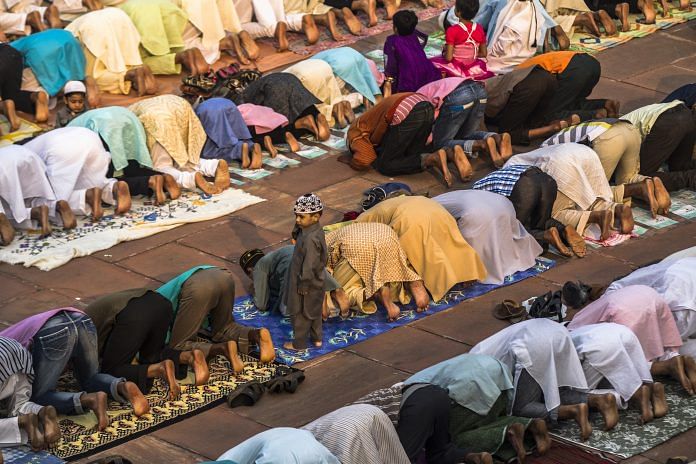In a recent column in ThePrint, Dilip Mandal explained why he does not support reservations for Dalit Muslims and Christians anymore. I presume he does not deny their dire predicament.
Mandal’s new position is based on a recent research paper by Arvind Kumar, published in the journal South Asia Research, which provides a comprehensive understanding of the historical origins of reservation for Scheduled Castes. But the denial of SC reservation to Dalit Muslims, based on a few fallacious premises, is an injustice to them and compounds discrimination.
Religious text or practice of untouchability?
Most scholars cite “Islamic” egalitarian values as one of the justifications for denying SC status to Dalit Muslims. They contend that Islamic texts rule out caste-based divisions whereas Hinduism has a distinct hierarchical caste system. The often-cited Manusmriti states that Brahmins descended from Brahma’s head (mouth), Kshatriyas from his arms, Vaishyas from his thighs, and Shudras from his legs. But prehistoric texts are variously interpreted depending on the context — there is an obvious distinction between textual provision and practice.
Were Dalits granted SC status because a religious text mandated a caste hierarchy or because untouchability was widely practised? Reservation was conceived as an affirmative action that seeks to alleviate the discrimination faced by the disadvantaged.
If your argument against granting SC status to Muslim Dalits is based on religious texts, then you are effectively challenging the practice of untouchability. Since the Constitution prohibits caste-based discrimination, has untouchability vanished from society? No, it is still practised, no matter how much you deny it. Therefore, in this context, it is important to separate theory from practice. Just because elite Muslims are squeamish about acknowledging discrimination within their society doesn’t mean the Indian State shouldn’t.
The main issue is that discourse about Dalit Muslims and their experiences of untouchability does not exist in the public domain due to a lack of scholarly discussion. Caste is an inherent aspect of Indian society — it is practised in every religious community.
Conversion from Hinduism to Islam is another argument used to deny SC status to Muslims. Many argue that when Dalit Hindus convert to Islam for social equality, they are excommunicated from the caste system and do not need the benefits of affirmative action. However, there is a significant research gap on this issue. Conversion may happen due to various other reasons, such as fear, greed, business, and livelihood. The first known Hindu to have converted to Islam was a Brahmin king (Cheraman Perumal) from Kerala. Why would an elite Hindu, enjoying all the societal privileges, convert to Islam? Did he desire equality under Islam? Certainly not. Many Brahmins and Kshatriyas have similar surnames as Muslims —Chaudhari, Malik, Mirza, Chauhan, Patel are common in both communities. Many Hindus may have just followed their rulers and landlords and converted to Islam.
The most notable mass conversion in modern India was led by BR Ambedkar, whose followers converted to Buddhism, which, like Islam, has no caste system. Buddhism rejects caste prejudice, and Babasaheb himself chose it as a religion of equality. And yet, those who convert to Buddhism are granted the SC quota. So why are Muslim and Christian Dalits not acceptable for SC status?
While one may choose their faith, caste has always remained unchangeable.
Also read: UCC will prevent the ‘Ashraafisation’ of Islam and give Pasmandas a seat at the…
Syedwad vs Manuwad
Kumar points out that the term “Scheduled Castes” is not religion-neutral. He explains that the designation was originally intended for Hindus alone, but the Constitution (Scheduled Castes) Order of 1950 was altered to include Sikhs (1956) and Buddhists (1990). Kumar refers to the 1949 Constituent Assembly debates for the inclusion of a Sikh SC category, as demanded by their representative. He substantiates this by mentioning that Sikh members bargained for SC status whereas Muslims and Christians didn’t. Kumar also added that according to these debates, the ‘elitist’ Muslim members hardly ever raised the matter of Dalit Muslims’ SC status.
The Muslim elite did not want the SC status to project their religion in a bad light and counter the prevalent idea of Islamic egalitarian principles. The actual reason was that there was no Dalit Muslim voice in the debate. Elite Muslims, brought up in feudalistic backgrounds who had never faced discrimination, failed to advocate for the inclusion of the marginalised within their community. They are silent on caste discrimination among Muslims in order to achieve their own religious and political ends.
Islam’s Syedwad is more toxic than Hinduism’s Manuwad. Hindu ‘upper’ caste at least acknowledges caste discrimination, but Syeds or elite Muslims, who enjoy socio-political and economic prestige, turn a blind eye toward it. Such denial worsens circumstances for the Dalit Muslim community.
There has been no Pasmanda Muslim leader at the national level since Independence. They rarely hold influence in media, academia, or administrative positions and even suffer from identity crises. Shirin Azam recently published a paper in the Contemporary South Asia journal, showing how local administrations withhold caste certificates from the Halalkhor community under various pretexts. The community is listed under the central Other Backward Classes (OBC) list.
The issue is the perception of the Muslim minority as a whole. Muslims aren’t homogenous — they clearly distinguish between castes.
Would Hindu Dalits have obtained SC status had Ambedkar not fought for it? Was it possible to secure SC quota if there were no SC leaders from the Sikh and Hindu communities at the time? Imagine a Dalit leader from a Muslim or Christian community participating in Constituent Assembly debates. What would have happened if the Muslim elite never ignored caste-based discrimination? Imagine if there was a discussion about Dalit Muslims in the mainstream.
Balhasan Ali is a demographer who works on inequality, labour demography, gender and social discriminatio and is currently affiliated with ICMR-NIMS, New Delhi. Views are personal.
(Edited by Humra Laeeq)



